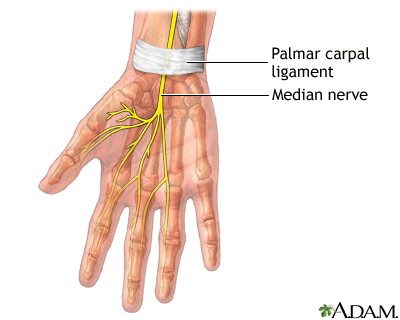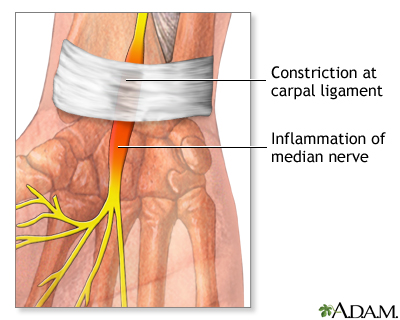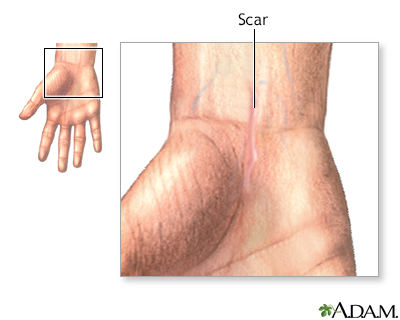Carpal tunnel repair
| Normal anatomy |
|
The tendons and nerve to the hand (median nerve) passes between strong ligaments (carpal ligaments) in the wrist and the wrist bones (carpal tunnel).
|
|
| Indications |
|
When the nerves or tendons inside the carpal tunnel swell or become inflamed (carpal tunnel syndrome), pressure on the nerve causes pain, numbness, tingling, or weakness in the fingers and wrist.
The nerve most commonly affected in carpal tunnel syndrome is the median nerve, which provides motor and sensory function to the hand.
Most physicians recommend trying non-surgical treatments (such as: splinting the wrist, using anti-inflammation medications) before recommending surgery.
|
|
| Procedure |
|
Carpal tunnel repair is done while the patient is awake or sleepy and pain-free (local or regional anesthesia) or deep asleep and pain-free (general anesthesia).
Through an incision on the inside of the wrist, the carpal ligament is cut open to relieve the pressure on the nerve. The incision is stitched (sutured) closed.
|
|
| Aftercare |
|
The surgery is usually very successful in relieving symptoms. Numbness or tingling that continues after surgery is usually due to damage to the nerve. A splint may be used to reduce wrist motion. The surgery is usually done as an outpatient. Complete recovery takes about 4 weeks.
|
|

|
Review Date:
6/4/2025
Reviewed By:
C. Benjamin Ma, MD, Professor, Chief, Sports Medicine and Shoulder Service, UCSF Department of Orthopaedic Surgery, San Francisco, CA. Also reviewed by David C. Dugdale, MD, Medical Director, Brenda Conaway, Editorial Director, and the A.D.A.M. Editorial team. |
The information provided herein should not be used during any medical emergency or for the diagnosis or treatment of any medical condition. A licensed medical professional should be consulted for diagnosis and treatment of any and all medical conditions. Links to other sites are provided for information only -- they do not constitute endorsements of those other sites. No warranty of any kind, either expressed or implied, is made as to the accuracy, reliability, timeliness, or correctness of any translations made by a third-party service of the information provided herein into any other language. � 1997-
A.D.A.M., a business unit of Ebix, Inc. Any duplication or distribution of the information contained herein is strictly prohibited.
� 1997-

All rights reserved.





